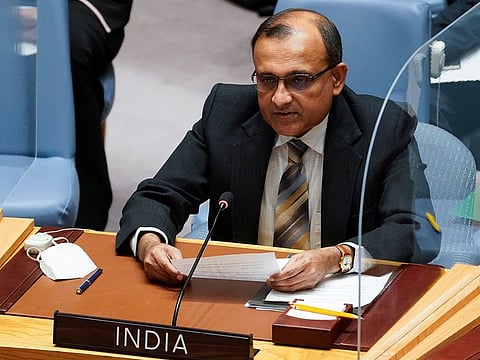The opportunities of neutrality: India’s role in the Russia-Ukraine crisis
New Delhi retained the option of reaching out to relevant sides to find the middle ground

In the ongoing Russian invasion of Ukraine, the situation is both fluid and volatile. Satellite images show nearly 5km-long Russian military convoys advancing towards Kyiv, the Ukrainian capital. Despite fierce resistance, it is not clear how long the Russian advance into Kyiv can be fended off or how soon the crisis can be resolved.
Already, close to 500 people are reported dead in this dangerous new war, with over 100,000 displaced Ukranians seeking refuge in neighbouring countries in Europe.
On Friday, Feb. 25, a session of the United Nations Security Council (UNSC) was held to try to resolve the Ukraine crisis caused by Russia’s invasion of its neighbour. The United States backed resolution to censure Russia was supported by United Kingdom and France.
Ireland, Norway, Albania from Europe, Gabon, Ghana, and Kenya from Africa, and Brazil and Mexico from Latin America all voted in favour of the motion. Quite expectedly, Russia, a permanent member of UNSC vetoed the motion.
China, another permanent member absented itself from the voting. India and the UAE also did not vote. On Sunday, Feb. 27, the three countries again absented themselves from a vote in the Security Council, which ultimately passed, to hold an emergency session of the UN General Assembly.
Calls for dialogue
Instead, Prime Minister Modi “reiterated his call for an immediate cessation of violence and a return to dialogue.”
Earlier, soon after the invasion, Modi had a telephone conversation with Russian President Vladimir Putin. In the official communique of what transpired between them Prime Minister, Modi expressed the “long-standing conviction that the differences between Russia and the Nato group could only be resolved through honest and sincere dialogue.”
Modi “appealed for an immediate cessation of violence, and called for concerted efforts from all sides to return to the path of diplomatic negotiations and dialogue.” He also expressed concern about the safety of the 15,000 Indian students in Ukraine. Several sorties have already been conducted to evacuate them. But many thousands still remain, in conditions that are very precarious, even life-threatening.
India has been moving closer to the US strategically, especially in the Asia-Pacific, with initiatives such as the QUAD to counter China’s growing clout in the region.
Yet, by abstaining from any overt criticism of Russia, India seemed to revert to its erstwhile stance of neutrality, if not equidistance from Cold War antagonists, America and Russia. After India refrained from voting against Russia, the latter said that it “highly appreciated” India’s “independent and balanced” position during the vote.
India’s long-standing friendly relations with Russia cannot be denied or dumped overnight. Russia, besides being an established friend, remains India’s major arms supplier and strategic partner. Recently, India decided to opt for the Russian S-400 surface-to-air missiles, risking the displeasure of the US. For that matter, India also has defence deals with Ukraine, enjoying good relations with Kyiv.
India’s restraint
But what is forgotten in the Western media, which has highlighted Washington’s disappointment with the Indian position, is that there is an additional reason for India’s restraint in this matter.
As member of the Security Council and one of the world’s largest countries and economies, India has an additional, mediative role to play, which it cannot compromise or squander by taking sides in a hasty, premature, or precipitous manner. Winning the trust of both sides is the prerequisite to playing a constructive role.
Similarly, UAE, a close ally of the US, also enjoys good relations with both Russia and China. Both India and UAE have pursued an independent strategic and diplomatic track during the present crisis. It would appear that the objective is to help negotiate a settlement, if such an opportunity should present itself. UAE, also a member of the Security Council, has a much bigger role to play in world affairs.
Little domestic traction
US’ hasty and clumsy retreat from Afghanistan has emboldened its adversaries. They know that the US is no longer interested in sending its soldiers to die on distant shores for causes which have little domestic meaning or traction. But US inability to prevent a Russian attack, nor indeed to solve the problem speedily, is bound to send jitters in other parts of the world.
This brings us back to India’s response, “Talks only way out.” In today’s global environment, old-style wars are both unacceptable and undesirable. The costs are simply too high, the sanctity of borders and sovereignty of nations too deeply entrenched.
A welcome sign is that a dialogue has already started between Ukraine and Russia. Everything that needs to be done to support it, rather than escalate hostilities between the two, should be undertaken, whether openly or through invisible diplomatic channels.
As India’s permanent representative to the UN, TS Tirumurti said, “By abstaining, India retained the option of reaching out to relevant sides in an effort to bridge the gap and find the middle ground with an aim to foster dialogue and diplomacy.” In such a situation, we can only hope for the swiftest possible termination of hostilities and commencement of the peace process.
Sign up for the Daily Briefing
Get the latest news and updates straight to your inbox




